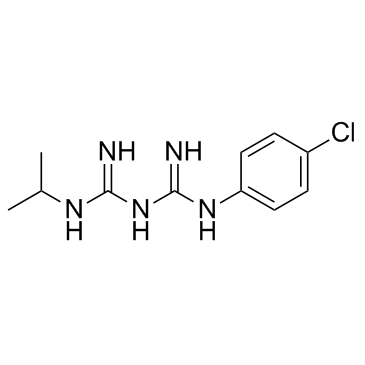Proguanil (Synonyms: Chlorguanide, Chloroguanide) |
| Catalog No.GC32085 |
El proguanil, un profÁrmaco antipalÚdico, se metaboliza al metabolito activo cicloguanil.
Products are for research use only. Not for human use. We do not sell to patients.

Cas No.: 500-92-5
Sample solution is provided at 25 µL, 10mM.
Proguanil is an antimalarial prodrug that is metabolized to the active metabolite cycloguanil, a dihydrofolate reductase (DHFR) inhibitor.
Proguanil per se has only weak antimalarial activity in vitro (IC50=2.4-19 μM), and its effectiveness depends on the active metabolite cycloguanil (IC50=0.5-2.5 nM). The cycloguanil is a dihydrofolate reductase (DHFR) inhibitor. The combination of atovaquone and proguanil is synergistic in vitro. Both drugs also have activity against gametocytes and pre-erythrocytic (hepatic) stages of malaria parasites[1]. Proguanil acts as a biguanide rather than as its metabolite cycloguanil (a parasite dihydrofolate reductase [DHFR] inhibitor) to enhance the atovaquone effect; proguanil-mediated enhancement is specific for atovaquone, since the effects of other mitochondrial electron transport inhibitors, such as myxothiazole and antimycin, are not altered by inclusion of proguanil[2]. 5-HT3 receptor responses are reversibly inhibited by proguanil, the metabolite 4-chlorophenyl-1-biguanide (CPB) and the active metabolite cycloguanil (CG), with an IC50 of 1.81, 1.48 and 4.36 μM, respectively[3].
Proguanil could induce infertility in rats which may act by distorting the blood-testis barrier formed by the Sertoli cells. Duration dependent significant decrease in body and organ weights and also in sperm parameters is observed. Serum testosterone level is significantly decreased for proguanil treatment rats[4]. Administration of Malarone (atovaquone and proguanil) to experimentally B. gibsoni infected two dogs in chronic stage and three dogs in acute stage results in decrease in parasitemia, and clinical improvements are observed[5].
[1]. Pudney M, et al. Atovaquone and proguanil hydrochloride: a review of nonclinical studies. J Travel Med. 1999 May;6 Suppl 1:S8-12. [2]. Srivastava IK, et al. A mechanism for the synergistic antimalarial action of atovaquone and proguanil. Antimicrob Agents Chemother. 1999 Jun;43(6):1334-9. [3]. Lochner M, et al. The antimalarial drug proguanil is an antagonist at 5-HT3 receptors. J Pharmacol Exp Ther. 2014 Dec;351(3):674-84. [4]. Stephen AO, et al. Prolonged administration of proguanil induces reproductive toxicity in male rats. J Toxicol Sci. 2011 Oct;36(5):587-99. [5]. Iguchi A, et al. The in vitro interactions and in vivo efficacy of atovaquone and proguanil against Babesia gibsoni infection in dogs. Vet Parasitol. 2013 Nov 8;197(3-4):527-33.
Average Rating: 5 (Based on Reviews and 27 reference(s) in Google Scholar.)
GLPBIO products are for RESEARCH USE ONLY. Please make sure your review or question is research based.
Required fields are marked with *




















